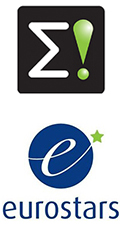Climate, energy, transport, environment
BRIDGE (2017- )

BRIDGE funds projects at the interface between basic research and science-based innovation that have the potential to develop an innovative product or service.
BRIDGE is a joint program of the Swiss National Science Foundation and Innosuisse.
Clean Sky (2008-2024)

The goal is to develop break-through technologies for the civil aviation market in order to cut aircraft emissions and noise, and to increase transport efficiency.
Clean Sky is a Joint Technology Initiative between the EU, companies (incl. SMEs), universities and public laboratories.
COST – European Cooperation in Science and Technology (1971- )

The goal is to bundle nationally funded research projects into pan-European networks (COST Actions) across all science and technology fields.
COST generally does not fund research but provides support for the networking activities within the COST Actions. The SNSF, the Swiss COST Coordinator, has limited funds available for research.
Note: Swiss participation depends on the COST Action.
EUREKA (1995-) INKL. EUROSTARS (2007-)

Eureka supports market-oriented projects between companies, research institutes and universities in order to strengthen Europe's competitiveness.
Eurostars, a joint program of Eureka and the European Commission, specifically supports innovative SMEs that want to develop new products, processes or services for commercialisation in cross-border collaborations.
Note: Swiss participation is funded by Innosuisse.
European Partnerships – Energy, Climate

The goal is to coordinate research and innovation activities to address Europe’s most pressing challenges. The European Partnerships are joint initiatives between the EU, national authorities and/or the private sector:
Batteries (BATT4EU); People‐centric Sustainable Built Environment (Built4People); Clean Hydrogen; Clean Energy Transition (CET).
See also: EIT InnoEnergy, EIT Climate.
Note: Swiss participation and funding depends on the partnership.
European Partnerships – Mobility

The goal is to coordinate research and innovation activities to address Europe’s most pressing challenges. The European Partnerships are joint initiatives between the EU, national authorities and/or the private sector:
Clean Aviation; Connected, Cooperative and Automated Mobility (CCAM); Driving Urban Transitions (DUT); Europe's Rail; Single European Sky (SESAR 3); Zero-Emission Road Transport (2Zero); Zero-Emission Waterborne Transport.
See also: EIT Urban Mobility.
Note: Swiss participation and funding depends on the partnership.
Federal Government Research

The federal government initiates and supports scientific research that deals with societal problems in 11 policy areas: health, social security, environment, agriculture, energy, sustainable spatial development and mobility, development and cooperation, security and peace policy, vocational training, sport and exercise, and sustainable transport. Some federal offices also fund research in other areas.
Fuel Cells and Hydrogen (2008-2024)

The goal is to accelerate the market introduction of fuel cell and hydrogen energy technologies in order to achieve a carbon-lean energy system.
FCH is a Joint Technology Initiative between the EU, industry (NEW-IG) and the research community (N.ERGHY).
US National Science Foundation

NSF supports basic research in all the non-medical fields of science and engineering.
NSF is a US government agency and the major source of funding in the USA for fields such as mathematics, computer science, economics and the social sciences.
Note: Swiss participation and financing depends on the call.
